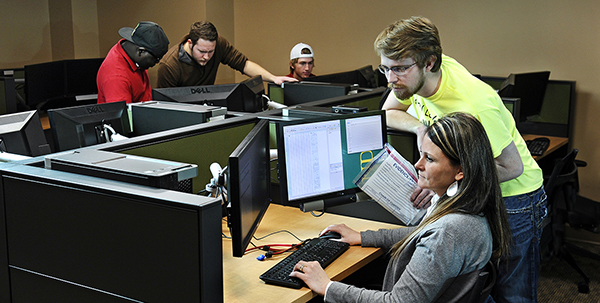STUDENT FOCUSED
New lab helps NDSU students learn how to crack fraud cases
Published February 2016

You’ve watched the scene countless times on television. Investigators enter a house and remove computers, tablets and smartphones as possible evidence. Knowing what to look for and how to properly handle this evidence is important. The smoking gun in many criminal fraud cases is some sort of digital device.
NDSU students are getting hands-on training on how to uncover fraud and computer crime thanks to a new computer forensic lab. It’s the first-and-only teaching facility of its kind in North Dakota. The lab features 10 workstations with built-in forensic technology.
“The lab is a unique hands-on experience opportunity for students because the equipment and software for computer forensics requires a sizable investment,” said lecturer Enrique Garcia. “It not only focuses on fraud, but computer crime in general.”
NDSU students often have opportunities to experience hands-on training in the classroom. Garcia teaches the Computer Crime, Forensics and Investigation course to undergraduate and graduate students as part of NDSU’s accounting and fraud investigation curriculum. He crafted a fake, but life-like case for students to crack throughout the semester. The course teaches students:
* How to respond to a computer incident with legal matters and corporate policy in mind.
* How to identify, lawfully collect and preserve digital evidence.
* How to process the evidence and conduct a search for notable items.
* How to present the findings in a report.
This knowledge will help students be competitive in the workforce, especially for jobs involving fraud cases or computer breaches, which are on the rise nationally. Jobs ranging from information technology, law enforcement and corporate accounting, for example, value fraud prevention and investigation skills.
“The use of technology in fraud investigations, and more specifically how to uncover and preserve evidence in digital environments, is crucial to successful investigations,” said Herb Snyder, professor and department chair.
Garcia and Snyder also are scheduling computer forensic training for North Dakota state law enforcement April 1-2.
“It is easy for first responders to a crime scene to lose or render digital evidence inadmissible, not because they’re careless, but because it requires special techniques to seize it as evidence,” said Snyder.
The law enforcement training will focus on fraud, computer crime and best practices to follow throughout investigations. The training will be similar to the course Garcia teaches to NDSU students.
The computer forensic lab opened January 2016 and is located in Barry Hall. The lab is part of NDSU’s College of Business website.